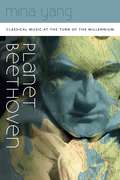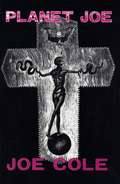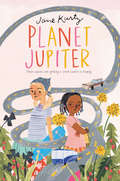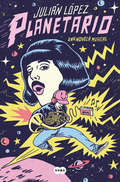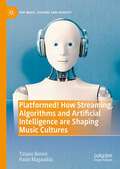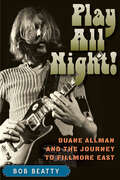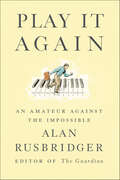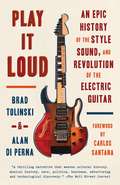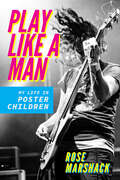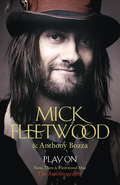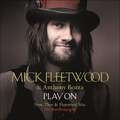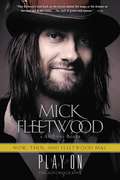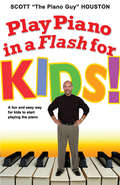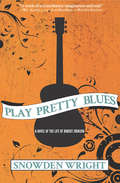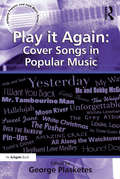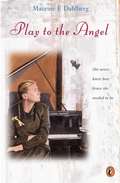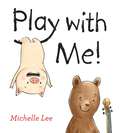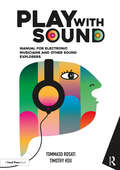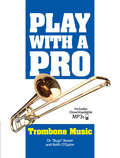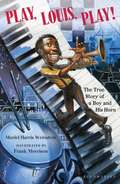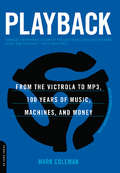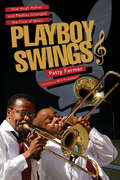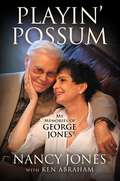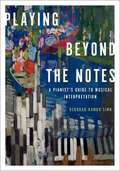- Table View
- List View
Planet Beethoven
by Mina YangIn Planet Beethoven, Mina Yang makes the compelling case that classical music in the twenty-first century is just as vibrant and relevant as ever--but with significant changes that give us insight into the major cultural shifts of our day. Perusing events, projects, programs, writings, musicians, and compositions, Yang shines a spotlight on the Western art music tradition. The book covers an array of topics, from the use of Beethoven's "Für Elise" in YouTube clips and hip-hop, to the marketing claims of Baby Einstein products, and the new forms of music education introduced by Gustavo Dudamel, conductor of the Los Angeles Philharmonic. While the book is global in its outlook, each chapter investigates the unique attributes of a specific performer, performance, or event. One chapter reflects on Chinese pianist Yuja Wang's controversial performance at the Hollywood Bowl, another explores the highly symbolic Passion 2000 Project in Stuttgart, Germany. Sure to be of interest to students, professionals, and aficionados, Planet Beethoven traces the tensions that arise from the "classical" nature of this tradition and our rapidly changing world.Ebook Edition Note: One image has been redacted.
Planet Joe
by Joe ColeLife on the road as seen through the eyes of Black Flag/Rollins Band roadie and Rollins confidante, Joe Cole. Tour journal documenting the final Black Flag tour and first Rollins Band tour.
Planet Jupiter
by Jane KurtzJupiter is used to being a planet of one, and she likes it that way. But then a cousin, who Jupiter never even knew existed, comes from Ethiopia to stay for the summer, and Jupiter is put in charge of taking care of her. A lyrical and memorable story of family, friendship, and community—perfect for fans of Katherine Hannigan’s Ida B and Holly Goldberg Sloan’s Counting by 7s.Jupiter and her family have spent their lives on the road, moving from town to town in a trusty old van and earning their living by playing music for tourists. But when their van breaks down, Jupiter’s mother rents an actual house in Portland for the summer so Jupiter’s annoying cousin Edom, recently adopted from Ethiopia, can stay with them. Luckily, Edom doesn’t want to be in Portland any more than Jupiter wants her there, and the two hatch a Grand Plan to send Edom back to her mother. In the process, Jupiter learns that community and family aren’t always what you expect them to be.A sweet, genuine story with themes of community, immigration, finances, family, and taking care of the environment that will appeal to fans of Cynthia Lord and Lynda Mullaly Hunt.
Planetario
by Julián LópezEl actor y cómico Julián López debuta en el panorama literario con una novela llena de sonidos y melodías, de emotividad y pequeños momentos, de tradición y modernidad. Un abuelo y su nieto tienden un puente en el que la música se convierte en refugio contra el alzhéimer y el olvido. Y los dos se dejan llevar por el hilo musical de toda una vida. Jota recorre la memoria de un tiempo en un pequeño pueblo del interior. Una infancia y una adolescencia marcadas por el amor hacia la música clásica y el descubrimiento de la voz de Freddie Mercury y las canciones de Queen. Planetario es una crónica sentimental sobre la vida en un pueblo de la España vacía durante los años ochenta y noventa, y sobre el poder evocador de la música.
Platformed! How Streaming, Algorithms and Artificial Intelligence are Shaping Music Cultures (Pop Music, Culture and Identity)
by Paolo Magaudda Tiziano BoniniGrounded in more than a decade of field research, this book uses empirical examples, quantitative data, and qualitative interviews with young music consumers as well as music industry professionals to understand how the platforms behind music production, distribution and listening work in our digital society. Bringing together the perspectives from science and technology studies, media studies, and the political economy of digital platforms, the book outlines the process of mutual construction between music digital platforms and the cultural value of music in today’s society, and also reflects on the complicated relationship between the power of platforms and the agency of listeners.
Play All Night!: Duane Allman and the Journey to Fillmore East
by Bob BeattyThe origin story of a groundbreaking album The 1971 Allman Brothers Band album At Fillmore East was a musical manifesto years in the making. In Play All Night!, Bob Beatty dives deep into the motivations and musical background of band founder Duane Allman to tell the story of what made this album not just a smash hit, but one of the most important live rock albums in history. Featuring insights from bootleg tapes, radio ads, early reviews, never-before-published photos, and the memories of band members, fans, and friends, Beatty chronicles how Allman rejected the traditional route of music business success—hit singles and record sales—and built a band that was at its best jamming live on stage, feeding off the crowd’s energy, and pushing each other to new heights of virtuosic improvisation. Every challenge, from recruiting a group of relatively unknown but established musicians like Jaimoe and Dickey Betts, touring the American South as an interracial band, and the failure of their first two studio albums, sharpened Allman’s determination to pursue the band’s truly unique sound. He made a bold choice—to record their next album live at Bill Graham’s famous concert hall in New York’s Lower East Side, a gamble that launched a new strand of American music to the top of the charts. Four days after the album went gold, Duane Allman was killed in a motorcycle accident. He was 24. This book explores how At Fillmore East cemented Allman’s legacy as a strong-willed, self-taught visionary, giving fans of Southern rock and all readers interested in the role of rock music in American popular culture a new appreciation for this pathbreaking album.
Play It Again: An Amateur Against the Impossible
by Alan RusbridgerThe Guardian editor and amateur pianist’s account of a remarkable musical challenge during an extraordinary year for news.As editor of the Guardian, one of the world’s foremost newspapers, Alan Rusbridger lives by the relentless twenty-four-hour news cycle. But increasingly in midlife, he feels the gravitational pull of music—especially the piano. He sets himself a formidable challenge: within a year, to fluently learn Chopin’s magnificent Ballade No. 1 in G minor, arguably one of the most difficult Romantic compositions in the repertory. With pyrotechnic passages that require feats of memory, dexterity, and power, the piece is one that causes alarm even in battle-hardened concert pianists.Under ideal circumstances, this would have been a daunting task. But the particular year Rusbridger chooses turns out to be one of frenetic intensity, beginning with WikiLeaks’ massive dump of state secrets and ending with the Guardian’s revelations about widespread phone hacking at News of the World. “In between, there were the Japanese tsunami, the Arab Spring, the English riots . . . and the death of Osama Bin Laden,” writes Rusbridger. The test would be to “nibble out” twenty minutes per day to do something totally unrelated to these events.Rusbridger’s subject is larger than any one piece of music: Play It Again deals with focus, discipline, and desire but is, above all, about the sanctity of one’s inner life in a world dominated by deadlines and distractions.Praise for Play It Again“An absorbing, adroitly crafted tale of humility, discipline and the sheer love of music . . . [Alan Rusbridger’s] triumph is an inspiration.” —Katie Hafner, The New York Times Book Review“A unique mélange of political and musical reportage . . . [Alan Rusbridger] illuminates not only print media in this digital age but also the changing role of the music within.” —Iain Burnside, The Observer (London)
Play It Loud: An Epic History of the Style, Sound, and Revolution of the Electric Guitar
by Brad Tolinski Carlos Santana Alan Di PernaBy the longtime editor-in-chief of Guitar World and a veteran rock journalist, an unprecedented history of the electric guitar, its explosive impact on music and culture, and the people who brought it to life.Spanning a century and encompassing some of guitar's greatest builders and players, from Les Paul to Keith Richards to Eddie Van Halen, Brad Tolinski and Alan di Perna bring the evolution of the guitar to roaring life. This is a story of inventors and iconoclasts, of scam artists, prodigies and mythologizers, as varied and original as the music they spawned. Play It Loud uses twelve landmark instruments, each of them a milestone in the progress of the electric guitar, to illustrate the chaos, conflict and passion it has inspired. It introduces Leo Fender, a man who couldn't play a note, but whose innovation helped transform the classical guitar into the explosive sound machine it is today. Some of the most significant social movements of the 20th century are indebted to the guitar: it was an essential part of Beatlemania and Woodstock; a mirror to the rise of the teenager as a social force; a linchpin of the punk movement's sound and ethos. And today the guitar has come full circle, with contemporary titans such as Jack White of The White Stripes and Dan Auerbach of The Black Keys bringing some of those earliest electric guitar forms back to the limelight. For generations, the electric guitar has been an international symbol of freedom, danger and hedonism. Play It Loud is the story of how a band of innovators transformed a simple notion into a singular cultural force.
Play It Loud: An Epic History of the Style, Sound, and Revolution of the Electric Guitar
by Brad Tolinski Carlos Santana Alan Di PernaAn unprecedented history of the electric guitar, its explosive impact on music and culture, and the players and builders who brought it to life For generations the electric guitar has been an international symbol of freedom, danger, rebellion, and hedonism. In Play It Loud, veteran music journalists Brad Tolinski and Alan di Perna bring the history of this iconic instrument to roaring life. It's a story of inventors and iconoclasts, of scam artists, prodigies, and mythologizers as varied and original as the instruments they spawned.Play It Loud uses twelve landmark guitars--each of them artistic milestones in their own right--to illustrate the conflict and passion the instruments have inspired. It introduces Leo Fender, a man who couldn't play a note but whose innovations helped transform the guitar into the explosive sound machine it is today. Some of the most significant social movements of the twentieth century are indebted to the guitar: It was an essential element in the fight for racial equality in the entertainment industry; a mirror to the rise of the teenager as social force; a linchpin of punk's sound and ethos. And today the guitar has come full circle, with contemporary titans such as Jack White of The White Stripes, Annie Clark (aka St. Vincent), and Dan Auerbach of The Black Keys bringing some of the earliest electric guitar forms back to the limelight.Featuring interviews with Les Paul, Keith Richards, Carlos Santana, Eddie Van Halen, Steve Vai, and dozens more players and creators, Play It Loud is the story of how a band of innovators transformed an idea into a revolution.From the Hardcover edition.
Play Like a Man: My Life in Poster Children (Music in American Life)
by Rose MarshackAs a member of Poster Children, Rose Marshack took part in entwined revolutions. Marshack and other women seized a much-elevated profile in music during the indie rock breakthrough while the advent of new digital technologies transformed the recording and marketing of music. Touring in a van, meeting your idols, juggling a programming job with music, keeping control and credibility, the perils of an independent record label (and the greater perils of a major)—Marshack chronicles the band’s day-to-day life and punctuates her account with excerpts from her tour reports and hard-learned lessons on how to rock, program, and teach while female. She also details the ways Poster Children applied punk’s DIY ethos to digital tech as a way to connect with fans via then-new media like pkids listservs, internet radio, and enhanced CDs. An inside look at a scene and a career, Play Like a Man is the evocative and humorous tale of one woman’s life in the trenches and online.
Play On: Now, Then and Fleetwood Mac
by Mick Fleetwood"After forty-six years of being on the road, now is the right time to look back in a way I've never done before: now and then. I'm looking forward to sharing it with you." Mick Fleetwood has been part of one of the world's most successful and adored bands for over four decades. Here he tells the full and candid story of that life, and what it is to be part of the ever evolving Fleetwood Mac. His all-access autobiography spans the career of one of classic rock's greatest drummers and band leaders, the co-founder of the deeply loved super group that bears his name. In this intimate portrait of a life lived in music, Fleetwood vividly recalls his upbringing in Cornwall, Egypt and Norway tapping along to whatever song was playing on the radio; his experiences as a musician in Sixties London; the early days of the band featuring Peter Green, and his close friendship with George Harrison and seemingly all of music royalty. Play On sheds new light on Fleetwood Mac's raucous history describing the highs and lows of being part of a band that he often single-handedly kept together. His love affair with Stevie Nicks, the creation of landmark albums like Rumours and Tusk, and the many incredible and outrageous moments of recording, touring, fighting, and loving with Fleetwood Mac: all are here. He describes his life's moments with the honesty and immediacy that his fans expect, taking us to the very heart of this multi layered life. It's been a tumultuous journey with the excesses of the band's huge success at times threatening to destroy what they strived so hard to create. But through it all it's been the drive to play on that has won out. Now, then, and always, it's Fleetwood Mac.
Play On: Now, Then and Fleetwood Mac
by Mick Fleetwood"After forty-six years of being on the road, now is the right time to look back in a way I've never done before: now and then. I'm looking forward to sharing it with you." Mick Fleetwood has been part of one of the world's most successful and adored bands for over four decades. Here he tells the full and candid story of that life, and what it is to be part of the ever evolving Fleetwood Mac. His all-access autobiography spans the career of one of classic rock's greatest drummers and band leaders, the co-founder of the deeply loved super group that bears his name. In this intimate portrait of a life lived in music, Fleetwood vividly recalls his upbringing in Cornwall, Egypt and Norway tapping along to whatever song was playing on the radio; his experiences as a musician in Sixties London; the early days of the band featuring Peter Green, and his close friendship with George Harrison and seemingly all of music royalty. Play On sheds new light on Fleetwood Mac's raucous history describing the highs and lows of being part of a band that he often single-handedly kept together. His love affair with Stevie Nicks, the creation of landmark albums like Rumours and Tusk, and the many incredible and outrageous moments of recording, touring, fighting, and loving with Fleetwood Mac: all are here. He describes his life's moments with the honesty and immediacy that his fans expect, taking us to the very heart of this multi layered life. It's been a tumultuous journey with the excesses of the band's huge success at times threatening to destroy what they strived so hard to create. But through it all it's been the drive to play on that has won out. Now, then, and always, it's Fleetwood Mac.(P)2014 Hodder & Stoughton
Play On: Now, Then, and Fleetwood Mac: The Autobiography
by Mick Fleetwood Anthony BozzaMick Fleetwood, the drummer and cofounder of the mega-selling band Fleetwood Mac, tells all.In this candid, intimate portrait of a life lived in music, Mick Fleetwood sheds new light on well-known points in his history, including many incredible moments of recording and touring with Fleetwood Mac, as well as personal insights from a man who has been a major player in blues and rock n' roll since his teens.The group Fleetwood Mac has sold over 140 million records worldwide, and they continue to attract a huge following, selling out their biggest arena tour ever in 2013, decades after their debut. Finally, the group's admirers will have a unique portrait of what made Mick and the rest of the group tick in the midst of their massive success and personal trials.
Play Piano in a Flash for Kids!: A Fun and Easy Way for Kids to Start Playing the Piano
by Scott HoustonGetting a child to play piano has never been easier!As seen on public television nationwide, Scott "The Piano Guy" Houston is the leading authority on fast and fun piano instruction. In Play Piano in a Flash for Kids! he simplifies his unique and effective method of learning to play piano, making it accessible to even the youngest want-to-be pianists. Highlighting popular, not classical, music, this book fosters and nourishes an early love for music by giving children the tools to play their favorite popular songs.Your child will be able to: Learn the basics of piano playing using a simple technique that pros use, which focuses on becoming a good player versus becoming a good notation reader Use easy-to-follow step-by-step illustrations that demonstrate each stage of learning Play popular music on the piano without having to learn how to read complicated sheet musicIt is a great book for kids who may have taken lessons previously but became frustrated by the long and complicated process. And all at a fraction of the cost of piano lessons!Both parents and children can have fun learning the piano or keyboard together, or children can work through the book on their own, with parents providing support only when needed. Play Piano in a Flash for Kids! is the perfect tool for parents or teachers to help their kids learn to play the piano quickly and easily.
Play Pretty Blues
by Snowden WrightThe mysteries of blues legend Robert Johnson's live and death long ago became myth. Part researched reconstruction, part vivid imagination, this lyrical novel brings Johnson alive through the voices of his six wives, revealing the husband and son inside the legend, illuminating the vacuum Johnson left in the worlds of those who loved him and those he would never meet.
Play it Again: Cover Songs In Popular Music (Ashgate Popular and Folk Music Series)
by George PlasketesCovering”the musical practice of one artist recording or performing another composer's song”has always been an attribute of popular music. In 2009, the internet database Second Hand Songs estimated that there are 40,000 songs with at least one cover version. Some of the more common variations of this "appropriationist" method of musical quotation include traditional forms such as patriotic anthems, religious hymns such as Amazing Grace, Muzak's instrumental interpretations, Christmas classics, and children's songs. Novelty and comedy collections from parodists such as Weird Al Yankovic also align in the cover category, as does the "larcenous art" of sampling, and technological variations in dance remixes and mash-ups. Film and television soundtracks and advertisers increasingly rely on versions of familiar pop tunes to assist in marketing their narratives and products. The cover phenomenon in popular culture may be viewed as a postmodern manifestation in music as artists revisit, reinterpret and re-examine a significant cross section of musical styles, periods, genres, individual records, and other artists and their catalogues of works.The cover complex, with its multiple variations, issues, contexts, and re-contextualizations comprises an important and rich popular culture text. These re-recordings represent artifacts which embody artistic, social, cultural, historical, commercial, biographical, and novel meanings. Through homage, allusion, apprenticeship, and parody, among other modes, these diverse musical quotations express, preserve, and distribute popular culture, popular music and their intersecting historical narratives. Play it Again represents the first collection of critical perspectives on the many facets of cover songs in popular music.
Play to the Angel
by Maurine F. DahlbergAustria in 1938 is under the shadow of the Nazis, but 12-year-old Greta doesn't notice--she cares only for her piano lessons with their new neighbor. Then the Nazis invade and Greta discovers her teacher's secret. His life is in danger, and she may be the only one who can help him.
Play with Me!
by Michelle LeePlaytime means very different things to these two spirited friendsPip is full of ideas for what to play: Dress up! Magicians! Dolls! Only, Nico doesn&’t want to play any of them, and Pip gets mad. REALLY mad. But don&’t worry—Nico finds the perfect way for them to play together. Michelle Lee&’s irresistible characters show that finding a way to play together will always hit the right note.
Play with Sound: Manual for Electronic Musicians and Other Sound Explorers
by Tommaso Rosati Timothy HsuPlay with Sound: Manual for Electronic Musicians and Other Sound Explorers offers a thorough introduction to music technology by centering on curiosity and creativity in the exploration of the fundamentals of sound.With color illustrations throughout, this book covers topics regarding audio software, acoustical principles, electroacoustic systems, audio processing, sound synthesis, and communication protocols. Each chapter features creative exercises that utilize live electronics, production, and composition to unearth the theories presented and develop technical and musical creativity. Additionally, interactive graphics and lesson slides are available as digital resources to enhance learning inside and outside the classroom.Play with Sound is an ideal textbook for beginners of all backgrounds looking for an introduction to music technology, production, and live electronics. By engaging with this book, everyone, including traditional students as well as those learning outside the traditional classroom setting, will be able to expand their musical skills and professional opportunities into the world of music technology.
Play with a Pro: Trombone Music
by Keith O'Quinn Dr Bugs BowerFrom Dixieland and boogie woogie to swing, blues, jazz, bop, Latin, and rock music, this title offers a variety of styles. Along with music to fifteen songs, downloadable MP3s provide a chance to play with a top Broadway trombonist.Each song is recorded three ways:1. Practice playing melody (1st trombone) or harmony (2nd trombone) with the title tracks, MP3s 1-15, marked TT.2. Practice playing melody (1st trombone) with accompaniment, MP3s 16-30, marked MT. 3. Practice playing harmony (2nd trombone) with accompaniment, MP3s 31-45, marked HT.These rehearsal routines are comparable to playing a 25-minute set with a live stage band!
Play, Louis, Play!: The True Story of a Boy and his Horn
by Muriel Harris WeinsteinThe book delivers a rollicking biography of jazz great Louis Armstrong's childhood, told from the perspective of his dearest companion--his horn.
Playback: From the Victrola to MP3, 100 Years of Music, Machines, and Money
by Mark ColemanPlayback is the first book to place the fascinating history of sound reproduction within its larger social, economic, and cultural context-and includes appearances by everyone from Thomas Edison to En
Playboy Swings: How Hugh Hefner and Playboy Changed the Face of Music
by Will Friedwald Patty FarmerPlayboy—the magazine, the empire, the lifestyle—is one of the world’s best-known brands. Since the launch of Playboy magazine in 1953, two elements have been remarkably consistent: the first, obviously, is the celebration of nubile, female flesh. The second, readers may be surprised to learn, is Playboy’s involvement in the music scene. The Playboy experience was never just about sex but about lifestyle. Music—particularly the finest jazz, a personal passion of Hefner’s—has always been an essential component of that lifestyle. Playboy Swings focuses specifically on Playboy’s involvement in the music scene, its impact on popular entertainment (and vice versa), and the fabulous cadre of performers who took to the stages of the mythic Playboy Clubs and Jazz Festivals. Throughout Playboy Swings, Farmer demonstrates how Playboy helped change the world through music by integrating the TV shows, festivals, and the clubs.Complied through interviews with hundreds of people who were on the scene throughout Playboy’s rise, fall, and on-going renaissance, Playboy Swings carries readers on a seductive journey through the history of the empire—all the while focusing on the musical entertainment that made it unique. Hef’s personal passion for music—and his belief in it as a cornerstone of the Playboy ethos—has expressed itself in a wide range of media over Playboy’s 60-year history, and all of it comes alive in these pages. Famer takes the reader from the inception of the Playboy empire through the 1959 jazz festival, to the opening of club after club.With approximately 60 black and white photos, and a complete Playboy music reference guide, readers will think of music, not just Bunnies, when thinking about Playboy.Throughout the book, it is the artists who do most of the talking—and they have a lot to say about the golden era of Playboy entertainment.
Playin' Possum: My Memories of George Jones
by Nancy JonesIn Playin' Possum, readers get an intimate look at country music legend George Jones through the eyes of his wife of thirty years.Ask anyone who knows country music, &“Who was the GOAT—the greatest of all time?&” and the answers will inevitably lead to George Jones. Millions of people know the name of the iconic country music artist, George Jones, but few people know that behind the man and his golden voice was a strong, feisty woman who not only saved his life from cocaine addiction, alcoholism, and other abusive and self-destructive behaviors, but also was instrumental in saving his soul. Legends, half-truths, and downright lies abound about the iconic singer, but what secrets do people not know about him? What was it like to live with him through the darkest shadows and in the brightest of lights? Married for more than thirty years to the greatest country music singer who ever lived, the man Frank Sinatra had whimsically referred to as &“the second-greatest singer in America,&” Nancy Jones knew George Jones better than anyone else on earth—the good George and the bad George, the horrendous, and the hilarious. George and Nancy married March 4, 1983, and with her help and encouragement, he quit his wild and wicked ways—for a while. Nancy soon learned, however, that the demons held a strong grip on the man she loved, and they were not about to release him without a fight. But Nancy Jones is a tenacious fighter, and most people who knew &“the Possum,&” credit Nancy with saving his life and rebuilding his career. For the first time, in Playin' Possum, Nancy Jones reveals the true &“insider&” perspectives and little known poignant and as well as humorous stories about the country music icon—his battles with cocaine, alcohol, abusive behavior toward her and others, his battles with himself, and most of all, his battles against the demons that sought to control him and ultimately destroy him. Nancy knew there was a good man inside George Jones, and she felt strongly that God had given her the assignment to help him, even if he hurt her. She refused to give up on Jones. Although Tammy Wynette sang &“Stand By Your Man,&” it was actually Nancy Jones who stood by George for more than thirty years, and helped bring him to the Light. Together, they brought joy and light to millions of people.
Playing Beyond The Notes: A Pianist's Guide to Musical Interpretation
by Deborah Rambo SinnThis book demystifies the complex topic of musical interpretation by boiling it down to basic principles in an accessible writing style. The book targets pianists, piano teachers, and piano pedagogy students and incorporates over 200 musical examples from the intermediate and advanced piano repertoire.
